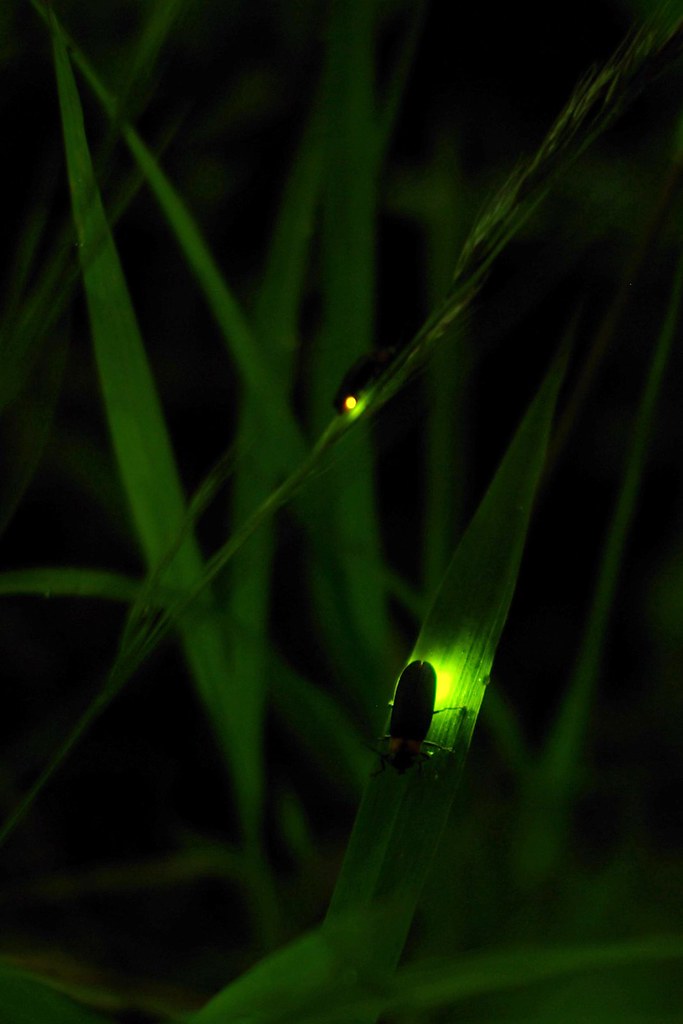Save The Fireflies
Written by Jessica Moore

Photo Credit: Takashi Ota

Photo Credit: Takashi Ota
I didn’t have the chance to
experience fireflies until three years ago when we moved to the East Coast from
the Las Vegas area. It had always been my dream to see them, and now
every summer I eagerly wait the summer months until I can see them flying
around my courtyard.
But, it wasn’t until recently,
that a neighbor and I were talking about them that I learned they were actually
in danger of a dwindling population. I found it hard to believe at first,
because there are so many in my neighborhood alone, but after some research,
sadly, I found out that was the case.
I’ve always been an advocate for
the bees, but after learning about the fireflies and what they do for the
environment rather than just add the sparkling lights that make summer nights
beautiful, I knew I had to promote the education about the population and help
share with others the ways we can help.
Fireflies, are insects - falling
under the category of beetles, and have an average life span of two months in
the wild. There are over 2,000 species of them and not all light up -
fireflies from the western areas of the U.S. don’t light up as they do on the
East Coast. Their diet is classified as omnivore, meaning they eat both
plants and animals as their main source of food. The firefly larvae
in particular are predators living in the ground that eat a variety of other
insects such as snails, worms, aphids, slugs and other
insects we consider as pests. As adults, they eat nectar and pollen.
But as humans, as we continue to
build for our population, in turn, we are wiping
out the habitat of fireflies. Not only is it loss of habitat, but along
with bees, the pesticides are destroying the firefly population, in addition to
the light pollution that causes their signaling for mating to be irregular.
A car could go by and throw off their mating rituals, which in turn
prevents them from mating all together adding to the decline of their
population. This repeats over and over leading to less fireflies the
following season.
While researching, I also learned
that fireflies are pollinators. Since then, I’ve been telling everyone
that brings them up when we are outside, that they play a role in the process
of pollinating several plants such as milkweed and wild sunflowers.
Fireflies also play a role in
medical research; luciferin and luciferase, enzymes that are used in the
bioluminescene light the fireflies put out are used to track cancer growth
which may be playing a role in the declining numbers of the species.
Medical companies pay for fireflies by the thousands in order to use their
enzymes for medical testing.
I could go on and on about the
declining population and educate you on why fireflies are important to the
environment, as many other species are, but I would like for you to help make
the difference in their population. My neighbor also stated - and this I
found VERY interesting, was that you can help track the fireflies easily, by
sitting on your porch with a drink of your choice, for 10 minutes once a
week. Firefly
Watch Citizen Science Project lets the public get involved. Whether
you see them or not, it is valuable information for Mass Audubon and Tufts
University to see the impact of your location on the species numbers.
When you watch the fireflies,
you’ll note when you share your reporting:
- Habitat
- Temperature
- Precipitation
- Wind
- Cloud Cover
- Light Pollution
You will also learn about the
flash patterns depending the species in your area.
You also can help by turning off
your porch lights and minimizing light pollution, eating organic foods that
help limit the use of pesticides, plant flowers and protect the habitat they
live in.
I’m always one for “the more you
know” and education, so I was excited to do the research on this species
because they mean a lot to me on those summer nights where I watch my children
chase them around our yard. Fireflies help contribute to those summer
memories I’ll hold of my family forever, so protecting their declining
population is a great way to throw a little science into our evenings.

Comments
Post a Comment